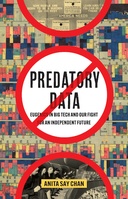Explore

Predatory Data illuminates the connections between the nineteenth century’s anti‑immigration and eugenics movements and today’s sprawling systems of techno-surveillance and algorithmic discrimination. Historical and globally multisited, the book examines how dispossession, misrecognition, and segregation are being magnified by dominant knowledge institutions in the Age of Big Data.
Technological advancement has a history, including efforts to chart a path for alternative futures. Anita Say Chan explores these important parallel stories of defiant refusal and liberatory activism, such as how feminist, immigrant, and other minoritized actors worked to develop alternative data practices. Their methods and traditions, over a century old, continue to reverberate through global justice‑based data initiatives today. Predatory Data charts a path for an alternative historical consciousness grounded in the pursuit of global justice.
“Anita Say Chan highlights the power of community‑based alternatives to extractive data that are rooted in feminist, people of color, and Indigenous perspectives. An essential book for anyone looking to envision more equitable technological futures.” — SHAKA McGLOTTEN, author of Virtual Intimacies
“An essential retelling of how data happened that also rethinks whose futures really matter in the worlds that data and AI are now building.” — NICK COULDRY, coauthor of The Costs of Connection
“Chan inspires us to understand the power and politics of data, and how to fight for an independent and inclusive future without compromising our humanness.” — MARY L. GRAY, MacArthur Fellow and coauthor of Ghost Work
“Predatory Data is the framework that we have been waiting for—to refuse, resist, and reimagine new possibilities as a part of decolonizing algorithmic and data practices.” — NISHANT SHAH, Associate Professor and Director of the Digital Narratives Studio, Chinese University of Hong Kong
ANITA SAY CHAN is a feminist and decolonial scholar of science and technology studies and Associate Professor of Information Sciences and Media Studies at the University of Illinois Urbana‑Champaign.
Why read this book? Have your say.
You must be logged in to comment.
